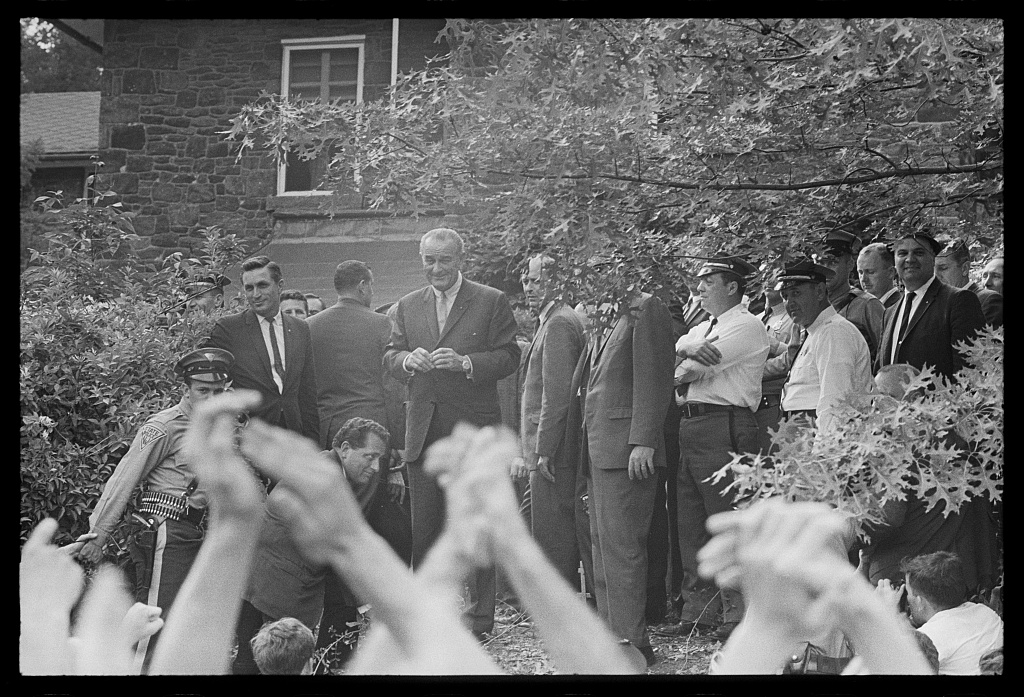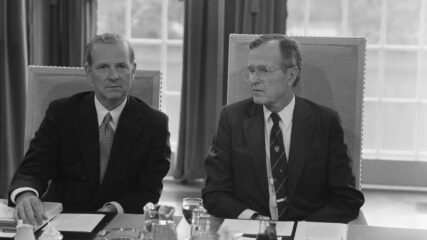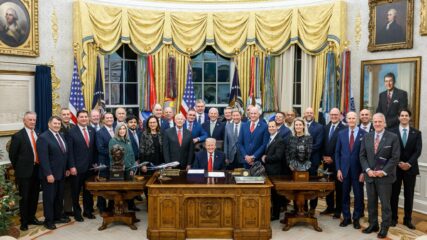June 19, 1967
Johnson, Lyndon. “Five Principles of Peace.” National Foreign Policy Conference of Educators. Washington, DC. 19 June 1967. Speech.
In 1957, Lyndon Johnson, then a U.S. senator from Texas, witnessed Israel’s withdrawal from the Sinai Peninsula after the 1956 war. He was privy to a promise about the U.N. troops stationed between Israeli and Egyptian forces not being removed unless the request wss first referred to the U.N. Security Council. Then as president, he saw the summary removal of these U.N. troops without Security Council approval at Egyptian request and saw Egypt and Israel slide inevitably toward war. It was perhaps not the smartest decision ever made by U.N. leadership.
After the war, he took the view as president that if Israel were to withdraw from Sinai again and from the territories taken in the June 1967 war, Israel and all states in the region should receive recognition and respect of their territorial integrity. In addition, he called for justice for the refugees without specifying which ones, protection of maritime rights of nations in the region, and opposition to an arms race between the combatants. These five principles ultimately outlined the formula for U.N. Security Council Resolution 242 in 1967. The resolution and formula of “land for peace” became the general diplomatic outline of subsequent successful Arab-Israeli treaty negotiations, including the 1979 Egyptian-Israeli treaty and the 1994 Jordanian-Israeli treaty.
Now, finally, let me turn to the Middle East — and to the tumultuous events of the past months. Those events have proved the wisdom of five great principles of peace in the region.
The first and greatest principle is that every nation in the area has a fundamental right to live and to have this right respected by its neighbors.
For the people of the Middle East the path to hope does not lie in threats to end the life of any nation. Such threats have become a burden to the peace, not only of that region, but a burden to the peace of the entire world.
In the same way, no nation would be true to the United Nations Charter or to its own true interests, if it should permit military success to blind it to the fact that its neighbors have rights and its neighbors have interests of their own. Each nation, therefore, must accept the right of others to live.
This last month, I think, shows us another basic requirement for settlement. It is a human requirement: justice for the refugees.
A new conflict has brought new homelessness. The nations of the Middle East must at last address themselves to the plight of those who have been displaced by wars. In the past, both sides have resisted the best efforts of outside mediators to restore the victims of conflict to their homes or to find them other proper places to live and work. There will be no peace for any party in the Middle East unless this problem is attacked with new energy by all and, certainly, primarily by those who are immediately concerned.
A third lesson from this last month is that maritime rights must be respected. Our nation has long been committed to free maritime passage through international waterways; and we, along with other nations, were taking the necessary steps to implement this principle when hostilities exploded. If a single act of folly was more responsible for this explosion than any other, I think it was the arbitrary and dangerous announced decision that the Strait of Tiran would be closed. The right of innocent maritime passage must be preserved for all nations.
Fourth, this last conflict has demonstrated the danger of the Middle Eastern arms race of the last 12 years. Here the responsibility must rest not only on those in the area but upon the larger states outside the area. We believe that the scarce resources could be used much better for technical and economic development. We have always opposed this arms race, and our military shipments to the area have consequently been severely limited.
Now the waste and futility of the arms race must be apparent to all the peoples of the world. And now there is another moment of choice. The United States of America, for its part, will use every resource of diplomacy and every counsel of reason and prudence to try to find a better course.
As a beginning, I should like to propose that the United Nations immediately call upon all of its members to report all shipments of all military arms into this area and to keep those shipments on file for all the peoples of the world to observe.
Fifth, the crisis underlines the importance of respect for political independence and territorial integrity of all the states of the area. We reaffirmed that principle at the height of this crisis. We reaffirm it again today on behalf of all. This principle can be effective in the Middle East only on the basis of peace between the parties. The nations of the region have had only fragile and violated truce lines for 20 years. What they now need are recognized boundaries and other arrangements that will give them security against terror, destruction, and war. Further, there just must be adequate recognition of the special interest of three great religions in the holy places of Jerusalem.
These five principles are not new, but we do think they are fundamental. Taken together, they point the way from uncertain armistice to durable peace. We believe there must be progress toward all of them if there is to be progress toward any.
There are some who have urged, as a single, simple solution, an immediate return to the situation as it was on June 4. As our distinguished and able Ambassador, Mr. Arthur Goldberg, has already said, this is not a prescription for peace but for renewed hostilities.
Certainly, troops must be withdrawn; but there must also be recognized rights of national life, progress in solving the refugee problem, freedom of innocent maritime passage, limitation of the arms race, and respect for political independence and territorial integrity.
But who will make this peace where all others have failed for 20 years or more?
Clearly the parties to the conflict must be the parties to the peace. Sooner or later, it is they who must make a settlement in the area. It is hard to see how it is possible for nations to live together in peace if they cannot learn to reason together.
But we must still ask, who can help them? Some say it should be the United Nations; some call for the use of other parties. We have been first in our support of effective peacekeeping in the United Nations, and we also recognize the great values to come from mediation.
We are ready this morning to see any methods tried, and we believe that none should be excluded altogether. Perhaps all of them will be useful and all will be needed.
I issue an appeal to all to adopt no rigid view on these matters. I offer assurance to all that this Government of ours, the Government of the United States, will do its part for peace in every forum, at every level, at every hour.
Yet there is no escape from this fact: the main responsibility for the peace of the region depends upon its own peoples and its own leaders of that region. What will be truly decisive in the Middle East will be what is said and what is done by those who live in the Middle East.










